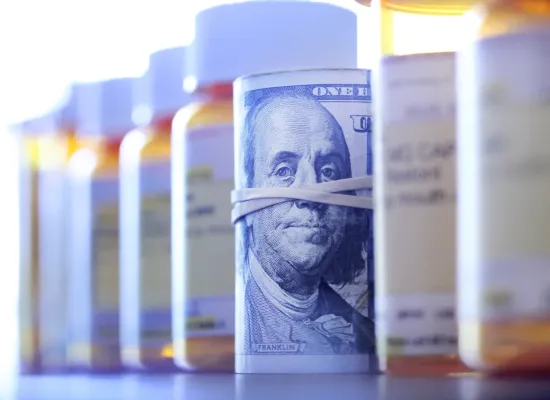
Biosimilar Drug Therapies
The Academy of Managed Care Pharmacy (AMCP) supports an abbreviated licensure pathway for the approval of biosimilar biologic drug therapies1 by the U.S. Food and Drug Administration (FDA). Biological products2 are certain to play an increasingly important role in the country’s health care system — both in terms of scientific improvements in the treatment of disease and increased drug costs. A streamlined approval process for biosimilar and interchangeable products provides a needed incentive for the development of new therapeutic products that hold the promise of preventing, treating, or curing otherwise inevitable, untreatable, and incurable diseases. Such a process will help ensure greater access to additional therapies at costs expected to be below those of an FDA-approved biological product, also known as a reference product.
It is important for the approval process to support an appropriate balance between bringing safe and effective drugs to market and maximizing patient access to affordable drugs. The regulatory process must rigorously examine the safety and efficacy of a biosimilar applicant while also minimizing the review time and the costs. To this end, the FDA should determine on a case-by-case basis whether to require additional clinical studies prior to approval, as well as any post-marketing studies.
AMCP supports biosimilar competition with reference products and therefore opposes any delays in this competition. This includes utilizing the FDA’s Risk Evaluation and Mitigation Strategies (REMS) program to block the development of biosimilars, additional patents to prevent biosimilar competition beyond the 12-year market exclusivity, and the requirement that a biosimilar manufacturer must provide a 180-day notice to the reference product sponsor from the date of FDA approval before a commercial launch.
AMCP encourages manufacturers of biosimilar products to bring these products to the U.S. market in a timely manner after market and patent exclusivity expires and to seek approval for all of the same FDA-approved indications as the reference product, when appropriate. The foundation of biosimilar development is the demonstration that chemical, physical, and biological parameters are highly similar to the reference product. Based on this, we support approval of biosimilars for all the clinical indications of the reference product based on the totality of the evidence.
According to the FDA, both biosimilar and interchangeable products can be used in 1) patients who have previously been treated with the reference product; and 2) in patients who have not been previously treated by the reference product.3 AMCP supports the ability of health care decision-makers to utilize managed care tools and strategies in public and private programs to encourage the safe and effective use of biosimilars. In situations where biosimilar and reference product indications are not identical, AMCP supports managed care decision-makers using clinical judgment to determine if use can be extended across all indications.
AMCP supports the establishment of consistent state regulations that allow pharmacists to substitute one biosimilar for another, as well as substitute a biosimilar for its reference product in a manner similar to how pharmacists currently interchange originator brands and their generic equivalents. AMCP also supports the need for individual HCPCS codes for each biosimilar, interchangeable product, and reference product in order to support transparency in billing and to allow for operational pull-through of any strategic initiatives by health care decision-makers, including preferred product strategies among equivalent biosimilars.
AMCP also supports eliminating the statutory interchangeability provision for biosimilars to further eliminate barriers to biosimilar adoption and align U.S. policy with established global markets like the European Union, where all approved biosimilars are considered substitutable.
Biosimilar disparagement has been recognized as a serious concern by the FDA and the Federal Trade Commission. AMCP opposes any efforts underway to disseminate misinformation that may create fears about biosimilars. Even though there is a growing body of evidence showing that patients can switch effectively and safely from a reference product to a biosimilar, there may still be doubt among clinicians and patients who may be hesitant to make those changes.4
AMCP understands the importance of educating pharmacists, physicians, nurses, and other health care providers on biosimilars in order to improve understanding and confidence in their safety and effectiveness. To help address this need, AMCP launched the Biologics and Biosimilars Collective Intelligence Consortium (BBCIC), an unbiased, policy-neutral repository of educational resources and information on biosimilars.5 The consortium was developed in partnership with leading national pharmacy organizations and can be accessed at www.bbcic.org.
See also:
Revised by the AMCP Board of Directors, July 2025
Revised by the AMCP Board of Directors, February 2023
Revised by the AMCP Board of Directors, October 2021
Revised by the AMCP Board of Directors, March 2017
Approved by the AMCP Board of Directors, April 2012
1 “A biosimilar is a biologic that is highly similar to another biologic, that is already approved by the FDA.” https://www.fda.gov/consumers/consumer-updates/biosimilar-and-interchangeable-biologics-more-treatment-choices
2 “Biological products include a wide range of products such as vaccines, blood and blood components, allergenics, somatic cells, gene therapy, tissues, and recombinant therapeutic proteins. Biologics can be composed of sugars, proteins, or nucleic acids or complex combinations of these substances, or may be living entities such as cells and tissues. Biologics are isolated from a variety of natural sources – human, animal, or microorganism – and may be produced by biotechnology methods and other cutting-edge technologies. Gene-based and cellular biologics, for example, often are at the forefront of biomedical research, and may be used to treat a variety of medical conditions for which no other treatments are available.” https://www.fda.gov/about-fda/center-biologics-evaluation-and-research-cber/what-are-biologics-questions-and-answers
3 https://www.fda.gov/media/154917/download
4 Barbier et al. (2020). The Efficacy, Safety, Immunogenicity of Switching Between Reference Biopharmaceuticals and Biosimilars: A Systematic Review. Clinical Pharmacology & Therapeutics, Vol. 108 (Issue 4), pg. 734-755. https://doi.org/10.1002/cpt.1836.
5 https://www.bbcic.org/about/about-bbcic
Featured News & Resources
See Full CalendarAward Applications Open
AMCP eLearning Day: Nexus Encore
AMCP 2026 Registration Opens
Upcoming Events
AMCP offers a wide variety of educational opportunities, from events and webinars to online training.







